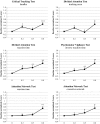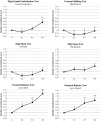Alcohol calibration of tests measuring skills related to car driving
- PMID: 24408210
- PMCID: PMC4039994
- DOI: 10.1007/s00213-013-3408-y
Alcohol calibration of tests measuring skills related to car driving
Abstract
Rationale: Medication and illicit drugs can have detrimental side effects which impair driving performance. A drug's impairing potential should be determined by well-validated, reliable, and sensitive tests and ideally be calibrated by benchmark drugs and doses. To date, no consensus has been reached on the issue of which psychometric tests are best suited for initial screening of a drug's driving impairment potential.
Objective: The aim of this alcohol calibration study is to determine which performance tests are useful to measure drug-induced impairment. The effects of alcohol are used to compare the psychometric quality between tests and as benchmark to quantify performance changes in each test associated with potentially impairing drug effects.
Methods: Twenty-four healthy volunteers participated in a double-blind, four-way crossover study. Treatments were placebo and three different doses of alcohol leading to blood alcohol concentrations (BACs) of 0.2, 0.5, and 0.8 g/L.
Results: Main effects of alcohol were found in most tests. Compared with placebo, performance in the Divided Attention Test (DAT) was significantly impaired after all alcohol doses and performance in the Psychomotor Vigilance Test (PVT) and the Balance Test was impaired with a BAC of 0.5 and 0.8 g/L. The largest effect sizes were found on postural balance with eyes open and mean reaction time in the divided attention and the psychomotor vigilance test.
Conclusions: The preferable tests for initial screening are the DAT and the PVT, as these tests were most sensitive to the impairing effects of alcohol and being considerably valid in assessing potential driving impairment.
Figures




References
-
- Bond A, Lader M. The use of analogue scales in rating subjective feelings. Br J Med Psychol. 1974;47(3):211–218. doi: 10.1111/j.2044-8341.1974.tb02285.x. - DOI
-
- Borkenstein F, Crowther RF, Shumate RP, Zeil WB, Zylman R. The role of the drinking driver in traffic accidents. Bloomington: Indiana University; 1964.
-
- Boyle J, Danjou P, Alexander R, Calder N, Gargano C, Agrawal N, Murphy MG. Tolerability, pharmacokinetics and night‐time effects on postural sway and critical flicker fusion of gaboxadol and zolpidem in elderly subjects. Br J Clin Pharmacol. 2009;67(2):180–190. doi: 10.1111/j.1365-2125.2008.03331.x. - DOI - PMC - PubMed
Publication types
MeSH terms
Substances
LinkOut - more resources
Full Text Sources
Other Literature Sources

